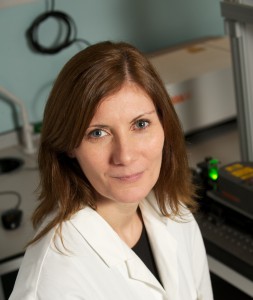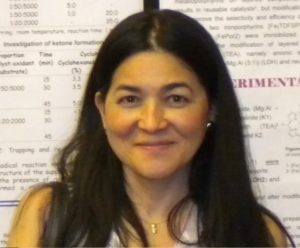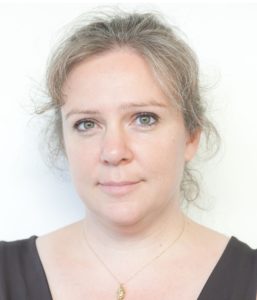International Women’s Day (IWD) is celebrated annually on March 8th to honour the achievements of women all around the world. IWD has been observed since 1911 and remains significant in driving positive change for women. In honour of this day, at RSC Advances, would like to take the opportunity to highlight some members of our Editorial Board and Associate Editor group. These members share some of their own perspectives of being a woman in science, technology, engineering and maths (STEM), and provide some guidance for researchers.
Prof Karen Faulds, Editor-in-Chief, University of Strathclyde, UK
 What are some of the challenges you have faced as a woman in science and what positive progress have you seen throughout your career so far?
What are some of the challenges you have faced as a woman in science and what positive progress have you seen throughout your career so far?
Early in my career the majority of speakers at conferences and in leadership roles were white males. Very few women were invited to speak at conferences therefore as an early career researcher there were very few visible female role models. It means it was harder and often took longer for a women in science to get visibility for their research through invitations to conferences and to be involved in leadership roles. Work still needs to be done on this aspect but it is better than it was 20 years ago with more emphasis on ensuring woman are represented but we also need to make sure that the science community as a whole is represented at conferences and committees. Role models for all aspects of the community are needed that early career scientists can identify with!
What do you think are the main factors perpetuating the gender gap in STEM fields, and what can we do to help close this gap?
In academia there are challenges around short term contracts through postdoctoral years and having to move to different institutions, as well as competition for academic positions, meaning there is a huge amount of job instability which is extremely difficult for people with caring responsibilities. The system does not support this and many women chose to leave academia to have more stable positions that support more stable and flexible working. This needs to change.
What advice would you give to early career female researchers?
Find a good mentor and take advantages of all opportunities that come your way!
Karen’s top publications:
Depth prediction of nanotags in tissue using surface enhanced spatially offset Raman scattering (SESORS)
Matthew E. Berry, Samantha M. McCabe, Neil C. Shand, Duncan Graham and Karen Faulds
Chem. Commun., 2022,58, 1756-1759
Rapid ultra-sensitive diagnosis of clostridium difficile infection using a SERS-based lateral flow assay
Waleed A. Hassanain, Julia Spoors, Christopher L. Johnson, Karen Faulds, Neil Keegan and Duncan Graham
Analyst, 2021,146, 4495-4505
Stimulated Raman scattering microscopy with spectral phasor analysis: applications in assessing drug–cell interactions
William J. Tipping, Liam T. Wilson, Connie An, Aristea A. Leventi, Alastair W. Wark, Corinna Wetherill, Nicholas C. O. Tomkinson, Karen Faulds and Duncan Graham
Chem. Sci., 2022,13, 3468-3476
Prof Shirley Nakagaki Bastos, Editorial Board Member, Universidade Federal do Paraná, Brazil
 What are some of the challenges you have faced as a woman in science and what positive progress have you seen throughout your career so far?
What are some of the challenges you have faced as a woman in science and what positive progress have you seen throughout your career so far?
As a woman aiming to become a scientist in the field of chemistry and at the same time wanting to build a family, I faced a few issues during grad school, such as the need to create, together with my husband, a support network that was conciliatory with my research activities. Finding a full-time day care that had quality and was affordable, considering our scholarship budget at the time, was a challenge. Another one was the lack of outstanding inspiring female examples in the sciences in general, because even if they existed, they were not well-known. In addition, I took some time to recognize that there is gender inequality in the various sciences and therefore lack of discussion and search for solutions, among many other factors that discouraged girls from opting for this area of activity. Throughout my career I have seen a lot of progress in this area, mainly regarding the greater discussion of the need for a more pluralistic environment with regard to gender issues, working in the science area.
What do you think are the main factors perpetuating the gender gap in STEM fields, and what can we do to help close this gap?
Gender stereotypes are established in different cultures and areas of activity, mainly STEM, and the lack of information and knowledge contributes to their perpetuation. And, looking at my journey, I see how having a good support network, access to quality daycare and being able to count on my husband gave me the peace of mind to focus on my career as much as I wanted. I believe that only through the discussion of problems, knowledge and education can we arrive at answers that will act to reduce this gap.
What advice would you give to early career female researchers?
Everyday we face problems that can have solutions based on scientific knowledge and this knowledge can be discovered by anyone who is interested in the scientific solution, regardless of their gender. So, when it comes to the development of a scientific career, if it is their wish, researchers can, are able, and will be successful!
Shirley’s top publications:
Synthesis, crystallographic characterization and homogeneous catalytic activity of novel unsymmetric porphyrins
A. R. Antonangelo, K. C. M. Westrup, L. A. Burt, C. Grazia Bezzu, T. Malewschik, G. S. Machado, F. S. Nunes, N. B. McKeown and S. Nakagaki
RSC Adv., 2017,7, 50610-50618
New highly brominated Mn-porphyrin: a good catalyst for activation of inert C–H bonds
Vinicius Santos da Silva, Shirley Nakagaki, Geani Maria Ucoski, Ynara Marina Idemori and Gilson DeFreitas-Silva
RSC Adv., 2015,5, 106589-106598
Fabienne Dumoulin, Editorial Board Member and Associate Editor, Acibadem Mehmet Ali Aydinlar University, Türkiye
 What are some of the challenges you have faced as a woman in science and what positive progress have you seen throughout your career so far?
What are some of the challenges you have faced as a woman in science and what positive progress have you seen throughout your career so far?
I would say that problems started when I started to have ambition and apply to more prestigious tasks and positions. In a society I am involved with, I had to fight to have maternity considered in age calculations for young investigator awards. Also, when I ask for a better gender balance in various scientific activities (symposium organization in congresses), I still face those who argue “it should be about excellence, not gender”. Others argue “there are only 30% of women in our field, why should they be 50% in the board / committee / etc…”. If this is the case, they should rather wonder about the 30% ratio! It is hard to pinpoint significant progresses, it seems to be one step forward and one step back.
What do you think are the main factors perpetuating the gender gap in STEM fields, and what can we do to help close this gap?
The use of friendly but still respectful/considerate words should be used to describe/mention women. I remember a French professor who designated all female colleagues by “fillette” (meaning little girl), from students to full professor, without realizing the implications. When there are decisions to make, being a “fillette” does not help ascertain your credibility and generate respect. Also, how many colleagues, when learning that a female postgrad student is pregnant, immediately say “oh, she will not complete her Msc/PhD, for sure” instead of wondering how they could help? In their private lives, many women do not have a supportive partner who does their part at home – and I chose my words carefully because it is frustrating to hear male colleagues say they “help” their wife/partner. They are not “helping”, they are just doing their part.
Sadly, I do believe gender and other minority quotas work. I would prefer to be included in something “just because I am woman”, and be able to prove I actually deserve to be there, rather than not be included at all.
What advice would you give to early career female researchers?
Find other friendly (female or not) researchers and watch and warn each other when you suspect or see a gender-biased behaviour. Be kind to yourself: you have enough burden, it is not your mission to change the system alone, do not feel guilty if you don’ manage to or don’t have the strength to try. Be kind with all other women, including students, cleaning, and admin staff.
The theme of this year’s IWD is Embrace Equity. Do you have any recommendations for improving the STEM workforce to create an environment that better supports women?
- Do not let it be only a front to say something has been done, be active
- Defend long paternity leaves in academia
- Fight toxic metrics and evaluation criteria
- Increase funding
Fabienne’s top publications:
Far-red triplet sensitized Z-to-E photoswitching of azobenzene in bioplastics
Pankaj Bharmoria, Shima Ghasemi, Fredrik Edhborg, Raúl Losantos, Zhihang Wang, Anders Mårtensson, Masa-aki Morikawa, Nobuo Kimizuka,Ümit İşci, Fabienne Dumoulin, Bo Albinsson and Kasper Moth-Poulsen
Chem. Sci., 2022,13, 11904-11911
Phthalocyanine-based mesoporous organosilica nanoparticles: NIR photodynamic efficiency and siRNA photochemical internalization
Gülçin Ekineker, Christophe Nguyen, Sümeyra Bayır, Sofia Dominguez Gil, Ümit İşci, Morgane Daurat, Anastasia Godefroy, Laurence Raehm, Clarence Charnay, Erwan Oliviero, Vefa Ahsen, Magali Gary-Bobo, Jean-Olivier Durand and Fabienne Dumoulin
Chem. Commun., 2019,55, 11619-11622
The unique features and promises of phthalocyanines as advanced photosensitisers for photodynamic therapy of cancer
Pui-Chi Lo, M. Salomé Rodríguez-Morgade, Ravindra K. Pandey, Dennis K. P. Ng, Tomás Torres and Fabienne Dumoulin
Chem. Soc. Rev., 2020,49, 1041-1056
Check out our Women in Chemistry page to learn more about women working as chemists and the issues that affect them in science education.
In 2019, the Royal Society of Chemistry published a report to assess if publishing in the chemical sciences is gender biased. The full report and guidance as a result of the findings can be viewed here https://www.rsc.org/new-perspectives/talent/gender-bias-in-publishing











